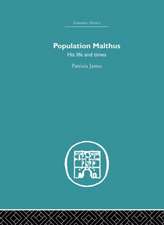From Old Regime to Industrial State: A History of German Industrialization from the Eighteenth Century to World War I: Markets and Governments in Economic History
Autor Richard H. Tilly, Michael Kopsidisen Limba Engleză Hardback – 26 oct 2020
Preț: 461.00 lei
Preț vechi: 501.09 lei
-8% Nou
Puncte Express: 692
Preț estimativ în valută:
88.21€ • 96.12$ • 74.33£
88.21€ • 96.12$ • 74.33£
Carte disponibilă
Livrare economică 03-17 aprilie
Livrare express 19-25 martie pentru 34.87 lei
Preluare comenzi: 021 569.72.76
Specificații
ISBN-13: 9780226725437
ISBN-10: 022672543X
Pagini: 312
Ilustrații: 3 maps, 23 line drawings, 66 tables
Dimensiuni: 152 x 229 x 28 mm
Greutate: 0.57 kg
Ediția:First Edition
Editura: University of Chicago Press
Colecția University of Chicago Press
Seria Markets and Governments in Economic History
ISBN-10: 022672543X
Pagini: 312
Ilustrații: 3 maps, 23 line drawings, 66 tables
Dimensiuni: 152 x 229 x 28 mm
Greutate: 0.57 kg
Ediția:First Edition
Editura: University of Chicago Press
Colecția University of Chicago Press
Seria Markets and Governments in Economic History
Notă biografică
Richard H. Tilly is emeritus professor of economic and social history at the University of Münster. Michael Kopsidis is deputy head of the department agricultural markets at Leibniz Institute of Agricultural Development in Transition Economies (IAMO).
Cuprins
Preface
Introduction, with Reflections on the Role of Institutional Change
Introduction, with Reflections on the Role of Institutional Change
Part One: Old Regime and Eighteenth-Century Origins of German Industrialization
One / Population and the Economy
Two / German Regions and the Beginnings of Early Industrialization
Three / Agricultural Change from the 1760s to the Early Nineteenth Century
Four / Institutional Change and the Role of Early Nineteenth-Century Prussian-German Reforms
Part Two: Early Industrialization, 1815–1848/49
Five / Early Industrialization, Government Policies, and the German Zollverein
Six / The Crises of the 1840s
Part Three: The Growth of Industrial Capitalism up to the 1870s
Seven / “Industrial Breakthrough” and Its Leading Sectors
Eight / Labor and Capital in the Industrial Breakthrough Period
Nine / Agriculture in the Period of Take-Off and Beyond
Ten / Money and Banking in the Railway Age
Part Four: Germany’s Emergence as an Industrial Power, 1871–1914
Eleven / Growth Trends and Cycles
Twelve / The Growth of Industrial Enterprise, Large and Small
Thirteen / Industrial Finance, Money, and Banking
Fourteen / Germany in the World Economy, 1870s to 1914
Fifteen / Urban Growth, 1871–1914: Economic and Social Dimensions
Epilogue: German Industrialization from a Twentieth-Century Perspective
Notes
References
Index
References
Index
Recenzii
“Tilly and Kopsidis have not only read a prodigious range of secondary sources on the diverse regional economies that evolved into modern Germany, but configured that literature into a narrative that connects its industrialization to geopolitics, state formation, public policy, and institutional development that goes back through heuristically demarcated stages of time into the eighteenth century. This book should be listed first on every bibliography in economic history.”
“During the nineteenth century the German economy developed into one of the most advanced in the world. Tilly and Kopsidis masterfully explain this rise to economic and technological leadership, starting with agricultural and institutional transformation in the eighteenth century and following the story through to the development, by the end of the nineteenth century, of distinctive financial institutions that supported an advanced industrial economy. Their account is lucid, creative, and well-grounded in both the research literatures and the broader sources. This volume provides an excellent entrée into the specialist literatures (in both German and English) and will serve as the standard English-language reference.”—
"This book describes the fascinating transformation of a backward inland area into a leading industrial economy. In their authoritative synthesis, Tilly and Kopsidis shed new light on subjects that form the staple of the economic history of industrialization—including unbalanced growth, railway construction and financing, and the modernization of agriculture—drawing on recent research to which both authors have made significant contributions."
"This book is an invaluable source of inspiration for everyone seeking to update themselves on Germany’s industrialization and the current state of research."
"Tilly and Kopsidis are opening a new narrative for questioning how institution and political regimes adopt technological change. For our current times, reading their work is an opportunity for expanding the new dynamics of capitalism development, especially in how new models of commercialization and production, as platform capitalism, are disrupting our current institutional regimes."
"Tilly and Kopsidis are opening a new narrative for questioning how institution and political regimes adopt technological change. For our current times, reading their work is an opportunity for expanding the new dynamics of capitalism development, especially in how new models of commercialization and production, as platform capitalism, are disrupting our current institutional regimes. In that way, Tilly and Kopsidis are offering a new question about the sense of institutional change."
"With their clearly-structured collation of quantitative economic-historical research, Kopsidis and Tilly succeed in synthesizing the multifaceted nature of German industrialization... The book is a wonderful introduction to the economic history of industrialization and it belongs in every well-stocked library."
"A concise, yet highly differentiated and insightful narrative of the making of the German industrial economy that connects industrialization to agriculture, state formation, the emergence of a modernizing bureaucracy, public and social policy, scientific knowledge and technology, migration and demography, and the change in
financial institutions."
financial institutions."
"For historians of the industrial revolution, contemplating Germany’s rise to an efficient, innovative and productive industrial economy is a must. Tilly and Kopsidis provide a fresh perspective on German economic history by considering many previous explanations and using the most recent scholarship, their own work as well as their deep reading into the subject matter."
"This concise book is an update of Tilly’s 1990 Vom Zollverein zum Industriestaat, first of all taking account of new material that enables the authors to move beyond the then conventional account of German industrialization; but second, extending the coverage back to the institutional roots of German development in the eighteenth century. This is a major shift. . . to a history in which the role of state and public administration, demography, and education gains due emphasis."

















![Teach Your Kids about Countries [Vol2]: Version Adaptada Al Castellano Actual Por Rafael Antunez y Raul Alonso](https://i1.books-express.ro/bt/9781480268166/teach-your-kids-about-countries-vol2.jpg)
![Teach Your Kids about Countries [Vol4 ]: Version Adaptada Al Castellano Actual Por Rafael Antunez y Raul Alonso](https://i3.books-express.ro/bt/9781480268180/teach-your-kids-about-countries-vol4.jpg)
![Teach Your Kids about Countries [Vol 5]: Version Adaptada Al Castellano Actual Por Rafael Antunez y Raul Alonso](https://i4.books-express.ro/bt/9781480268197/teach-your-kids-about-countries-vol-5.jpg)
![Teach Your Kids about Countries [Vol8]: Version Adaptada Al Castellano Actual Por Rafael Antunez y Raul Alonso](https://i2.books-express.ro/bt/9781480268227/teach-your-kids-about-countries-vol8.jpg)
![Teach Your Kids about Countries [Vol13]: Version Adaptada Al Castellano Actual Por Rafael Antunez y Raul Alonso](https://i2.books-express.ro/bt/9781480268272/teach-your-kids-about-countries-vol13.jpg)
![Teach Your Kids about Countries [Vol 17]: Version Adaptada Al Castellano Actual Por Rafael Antunez y Raul Alonso](https://i2.books-express.ro/bt/9781480268326/teach-your-kids-about-countries-vol-17.jpg)
![Teach Your Kids about Countries [Vol 22]: Version Adaptada Al Castellano Actual Por Rafael Antunez y Raul Alonso](https://i2.books-express.ro/bt/9781480268371/teach-your-kids-about-countries-vol-22.jpg)
![Teach Your Kids about Countries [Vol 25]: Version Adaptada Al Castellano Actual Por Rafael Antunez y Raul Alonso](https://i0.books-express.ro/bt/9781480268401/teach-your-kids-about-countries-vol-25.jpg)





